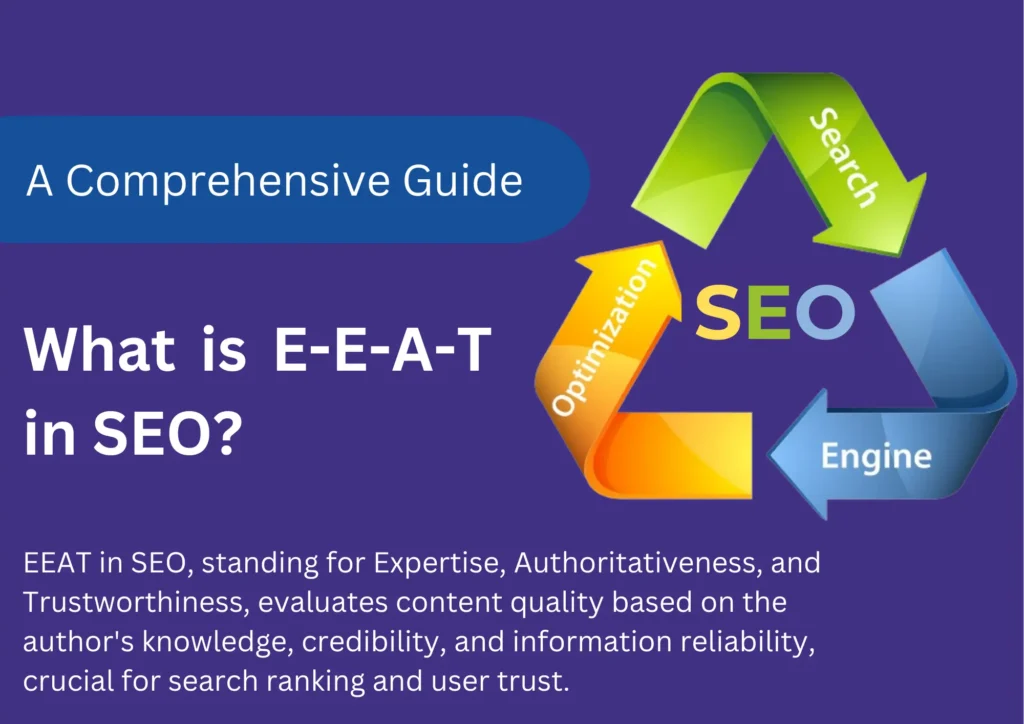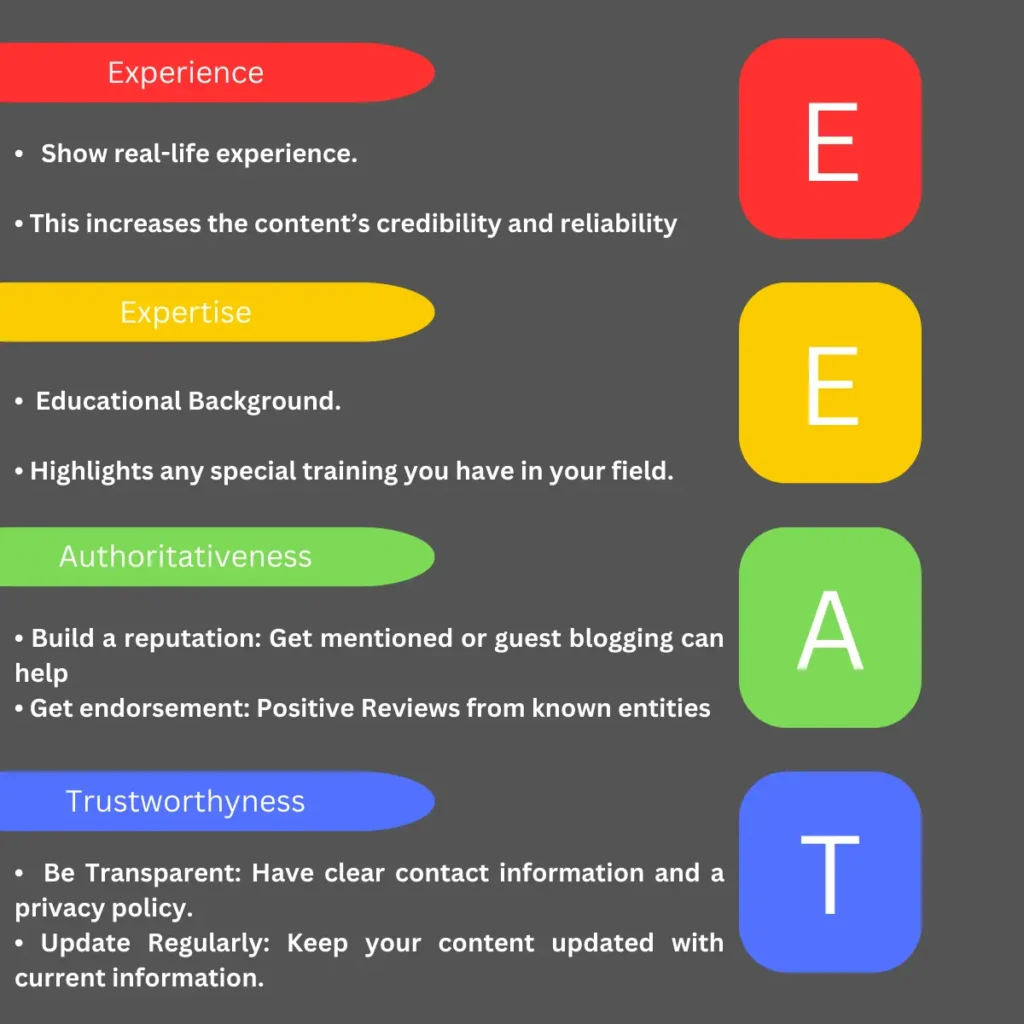What is EEAT in SEO?
EEAT in SEO, standing for Expertise, Authoritativeness, and Trustworthiness, evaluates content quality based on the author’s knowledge, credibility, and information reliability, crucial for search ranking and user trust.
Are you struggling to improve your website’s rankings on search engines? Unlocking the power of EEAT in SEO might be the answer you’re looking for. EEAT stands for Experience, Expertise, Authoritativeness, and Trustworthiness – four crucial factors that influence search engine rankings.
In the ever-evolving EEAT in SEO landscape, search engines like Google are placing increasing emphasis on these factors to ensure that they deliver high-quality, trustworthy content to their users. Gone are the days when simply optimizing your web pages with keywords was enough to rank well. Now, search engines are looking for websites that demonstrate expertise in their field, provide a valuable user experience, and are authoritative and trustworthy sources of information.

Establishing authoritativeness in your niche
Establishing authoritativeness in your niche is a fundamental aspect of SEO. When search engines evaluate your website, they consider the expertise you demonstrate and the authority you hold in your industry. The more authoritative your website is, the higher it is likely to rank in search engine results.
One of the best ways to establish authoritativeness is by creating high-quality, informative content that is relevant to your target audience. By consistently publishing well-researched articles, blog posts, and guides, you can position yourself as a trusted source of information in your niche. Additionally, guest posting on reputable websites and earning backlinks from other authoritative sources can enhance your website’s credibility.
Another important aspect of establishing authoritativeness is showcasing the expertise of your team members or contributors. Highlight their qualifications, certifications, and experience to give your website an added layer of credibility. This can be achieved through author bios, testimonials, and case studies that demonstrate their expertise and industry knowledge.
Understanding the importance of user experience (UX)
User experience (UX) plays a significant role in determining search engine rankings. When users visit your website, search engines analyze their behavior to understand the overall user satisfaction. If visitors navigate away from your site quickly or spend very little time on it, search engines may interpret this as a negative signal, leading to lower rankings.
To improve user experience on your website, consider the following factors:
1. Page load speed: Optimize your website’s loading time to ensure that visitors have a smooth browsing experience. Compress images, minify code, and leverage caching mechanisms to reduce page load speed.
2. Mobile responsiveness: With the increasing use of mobile devices, it’s crucial to ensure your website is mobile-friendly. Responsive design adapts your website’s layout and content to different screen sizes, providing a seamless experience for mobile users.
3. Intuitive navigation: Make it easy for users to find what they’re looking for by implementing clear and intuitive navigation menus. Use descriptive labels and organize your content in a logical structure to enhance user engagement.
4. Engaging and relevant content: Create compelling, informative, and unique content that meets the needs and interests of your target audience. By providing valuable information, you can keep users engaged and encourage them to explore more pages on your website.
By prioritizing user experience, you not only improve your website’s rankings but also create a positive impression on your visitors, increasing the likelihood of conversions and customer loyalty.

Benefits of E E A T
Experience, Expertise, Authoritativeness, and Trustworthiness—these four components of EEAT in SEO play a crucial role in determining the success of your SEO efforts. Understanding the benefits of focusing on each aspect can help you develop a comprehensive strategy to enhance your website’s rankings.
The impact of EEAT on search engine rankings
Now that you understand the benefits of focusing on EEAT, let’s explore how these factors impact search engine rankings. Search engines like Google use complex algorithms that analyze hundreds of ranking signals to determine the relevance and quality of a website. EEAT is one of the vital ranking factors that search engines consider to deliver the best results to their users.
Websites that prioritize user experience, demonstrate expertise, establish authority, and build trust are more likely to rank higher in search engine results pages (SERPs). By optimizing each aspect of EEAT, you can increase your website’s visibility, attract more organic traffic, and ultimately improve your rankings.
Strategies to improve your website’s EEAT
Now that you understand the importance of EEAT in SEO and its impact on search engine rankings, let’s explore some strategies to improve your website’s performance in each area.
Conclusion: Harnessing the power of EEAT for SEO success
In today’s competitive SEO landscape, understanding and harnessing the power of EEAT is essential for improving your website’s search engine rankings. By focusing on Experience, Expertise, Authoritativeness, and Trustworthiness, you can enhance your website’s visibility, attract more organic traffic, and establish credibility with both search engines and users.
Remember, SEO is a long-term process, and it requires continuous effort and optimization. By implementing the strategies outlined in this article, you can unlock the power of EEAT in SEO and take your SEO efforts to the next level. Stay up to date with the latest SEO trends and algorithm changes, adapt your strategies accordingly, and watch your rankings soar.
Now that you’re armed with the knowledge and strategies to unlock the power of EEAT in SEO, it’s time to put them into action. Start by assessing your website’s current performance in each aspect of EEAT and prioritize areas for improvement. With consistent effort and a focus on delivering high-quality, trustworthy content, you’ll be well on your way to SEO success.
